Contents
- 1 1st Bhagat Singh Speech (25 min)
- 2 2nd Bhagat Singh Speech (20 min)
- 3 3rd Bhagat Singh Speech (15 min)
- 4 4th Bhagat Singh Speech (10 min)
- 5 5th Bhagat Singh Speech (5 min)
- 6 FAQs
- 6.1 Who was Bhagat Singh?
- 6.2 What was the contribution of Bhagat Singh in India’s freedom struggle?
- 6.3 What is the significance of Bhagat Singh in Indian history?
- 6.4 What are some important events in Bhagat Singh’s life?
- 6.5 What was Bhagat Singh’s ideology?
- 6.6 What was Bhagat Singh’s legacy?
- 6.7 What can we learn from Bhagat Singh’s life?
Looking for an inspiring and informative speech on Bhagat Singh?Edukar has provided 5 best speeches on Bhagat Singh. These speeches cover his life, his beliefs, and his contributions to the Indian independence movement. Learn about his fearless spirit, his passion for justice, and his legacy that continues to inspire generations. Perfect for students, educators, and anyone interested in learning more about this iconic figure in Indian history.
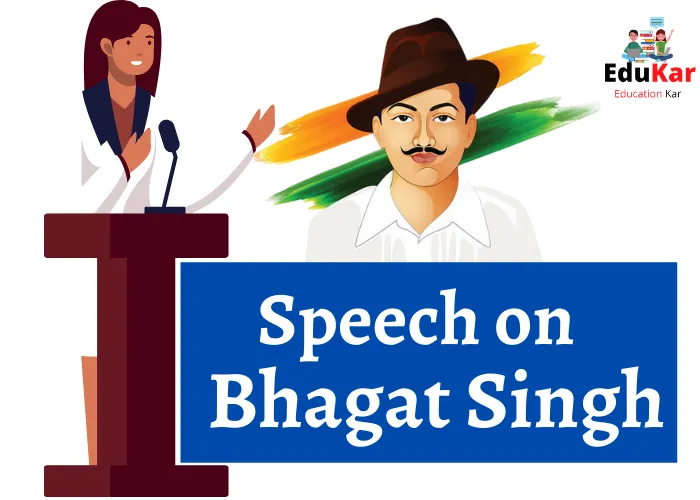
1st Bhagat Singh Speech (25 min)
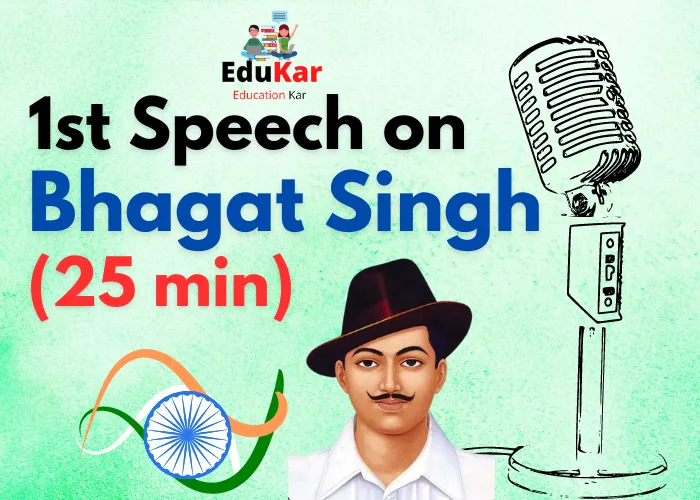
Respected Guests, Ladies and Gentlemen,
Today, I stand here to talk about one of the greatest revolutionaries and freedom fighters of India, Shaheed Bhagat Singh. He was born on September 28, 1907, in Banga village, Punjab, British India, and was one of the most influential figures in the Indian independence movement.
Bhagat Singh was a man of great intellect and a visionary leader who had a profound impact on India’s struggle for independence. He was a fierce nationalist who believed in the power of the youth to bring about change. His revolutionary ideas and fearless attitude inspired countless young men and women to take up the cause of freedom and fight against the British rule.
Bhagat Singh’s early life was marked by tragedy. His father, Kishan Singh, was a revolutionary who had been involved in several movements against the British. He was forced to flee to Iran to escape the British authorities, leaving behind his family. Bhagat Singh was just 12 years old at the time, and the responsibility of raising the family fell on his mother, Vidyavati. Despite the hardships, she managed to give her children a good education and instilled in them a sense of patriotism and love for the country.
Bhagat Singh was greatly influenced by the revolutionary movements of the time. He was deeply disturbed by the injustice and inequality that he saw around him and was determined to do something about it. He joined the Hindustan Republican Association (HRA), a group that was dedicated to fighting for India’s freedom from British rule. He was just 16 years old at the time.
Bhagat Singh’s first act of defiance against the British was the burning of the Simon Commission’s report in 1928. The Simon Commission was a group of British officials who had been sent to India to look into the possibility of granting greater autonomy to the Indian provinces. However, the commission did not have a single Indian member, and it was widely seen as a move to perpetuate British rule. Bhagat Singh and his colleagues set fire to the report in protest, and this act made them instant heroes among the Indian people.
Bhagat Singh’s next major action was the bombing of the Central Legislative Assembly in Delhi in 1929. The aim of the bombing was not to kill anyone but to draw attention to the cause of India’s freedom. Bhagat Singh and his colleagues threw leaflets from the gallery, shouting slogans like “Inquilab Zindabad” and “Down with British Imperialism.” They were arrested and put on trial for sedition.
During the trial, Bhagat Singh and his comrades used the court as a platform to espouse their revolutionary ideas. They refused to plead for mercy and instead used the opportunity to speak out against British imperialism and to call for a socialist revolution in India. Bhagat Singh famously declared that he was fighting for the “cause of the exploited and the downtrodden masses.”
Bhagat Singh’s trial and subsequent execution in 1931 was a turning point in India’s struggle for independence. His death shocked the Indian people, and his ideas and ideals continued to inspire generations of Indians long after he was gone. He remains a hero to millions of Indians who continue to draw inspiration from his life and work.
Bhagat Singh’s legacy is immense. He was a man of great vision and courage who believed in the power of the youth to bring about change. He was a socialist who believed in the principles of equality and justice for all. He was a man who was willing to sacrifice his life for the cause of India’s freedom.
Thankyou
2nd Bhagat Singh Speech (20 min)
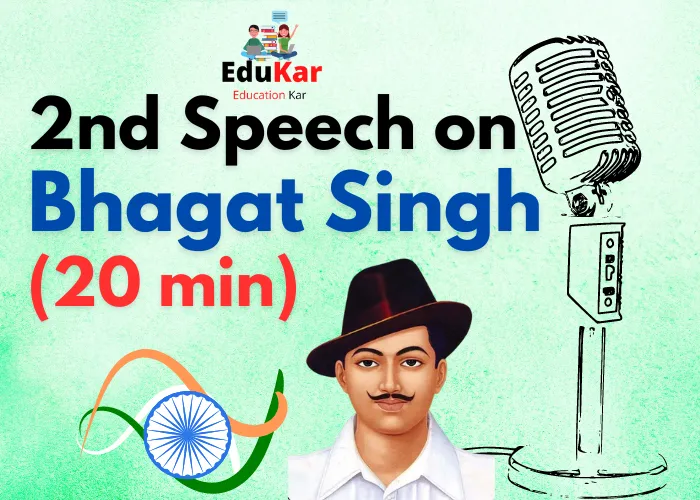
Respected Guests, Ladies and Gentlemen,
Today, I would like to talk about one of the most prominent figures in India’s struggle for freedom – Bhagat Singh. Bhagat Singh was born on September 28, 1907, in Banga village in present-day Pakistan. He was a revolutionary socialist who played a significant role in India’s freedom struggle against British rule. His contributions to the Indian independence movement are still remembered and celebrated today.
Bhagat Singh was an intellectual and a thinker who was deeply influenced by the ideas of socialism and communism. He believed that the British rule in India was not just a political issue but also an economic one. He felt that the exploitation of Indian resources and people by the British had to end, and that India needed to be free to become a truly democratic and egalitarian society.
At a young age, Bhagat Singh was already involved in revolutionary activities. He joined the Hindustan Socialist Republican Association (HSRA), which was a radical organization that advocated for India’s complete independence from British rule. Bhagat Singh and his comrades believed that armed revolution was the only way to achieve this goal, and they were willing to sacrifice their lives for the cause.
In 1928, Bhagat Singh and his comrades, Shivaram Rajguru and Sukhdev Thapar, were involved in the assassination of British police officer John Saunders, who was responsible for the death of Indian freedom fighter Lala Lajpat Rai. Bhagat Singh and his colleagues were arrested and put on trial for the murder. During the trial, Bhagat Singh made a famous statement that has become an inspiration for generations of Indians. He said, “They may kill me, but they cannot kill my ideas. They can crush my body, but they cannot crush my spirit.”
Bhagat Singh’s trial became a symbol of the struggle against British oppression in India. The British authorities were determined to make an example out of him and his comrades. However, Bhagat Singh and his colleagues used the trial as a platform to spread their message of revolution and freedom. They refused to plead for mercy and instead, used the opportunity to challenge the British colonial system.
Bhagat Singh’s ideas and actions continue to inspire people around the world. He was a visionary who believed in the power of the people to bring about change. He advocated for the rights of the working class, peasants, and farmers, and was a vocal critic of the capitalist system. He was also an ardent supporter of women’s rights and believed in gender equality.
Bhagat Singh’s legacy lives on today, not just in India but across the world. He is remembered as a hero who fought for the freedom of his country and the rights of his fellow citizens. His ideas and values continue to inspire people to fight for justice and equality.
Finally, Bhagat Singh was a visionary leader who dedicated his life to the cause of India’s freedom. He was a revolutionary socialist who believed in the power of the people to bring about change. His courage and determination have inspired generations of Indians to fight for their rights and freedom. We should all strive to uphold the values and principles that Bhagat Singh stood for and continue to work towards a society that is truly democratic, egalitarian, and just.
Thank you.
3rd Bhagat Singh Speech (15 min)
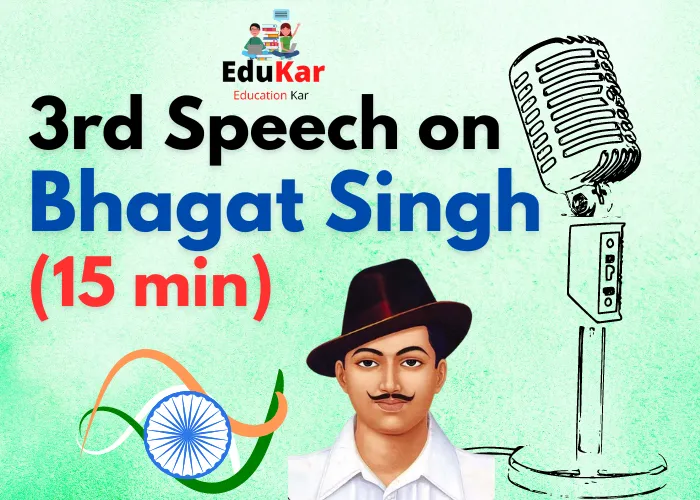
Dear fellow citizens,
Today, I want to talk about one of the most iconic and inspiring figures of Indian history – Bhagat Singh. He was a revolutionary socialist who fought against British colonialism and played a pivotal role in India’s struggle for freedom. His dedication, sacrifice, and patriotism continue to inspire generations of Indians, and his legacy lives on even today.
Bhagat Singh was born on 28th September 1907 in a small village in Punjab. His father, Kishan Singh, was a revolutionary himself, and his mother, Vidyavati, was a religious woman who instilled in her son a strong sense of ethics and morality. Bhagat Singh was a bright student from a young age and was deeply influenced by the events of the time, such as the Jallianwala Bagh massacre and the Non-Cooperation Movement.
At the age of 16, Bhagat Singh joined the National College in Lahore, where he became an active member of the Hindustan Republican Association (HRA). He was deeply influenced by the writings of Marx, Lenin, and other socialist thinkers and became a committed socialist and revolutionary. He believed that only through the overthrow of the British colonial government could India achieve true independence and freedom.
Bhagat Singh’s first act of revolutionary violence came in 1928 when he and his comrades, Shivaram Rajguru and Sukhdev Thapar, assassinated British police officer J.P. Saunders in Lahore. The three were arrested and put on trial, but instead of pleading for mercy, Bhagat Singh used the trial as a platform to spread his message of revolution and resistance. He and his fellow revolutionaries chanted slogans such as “Inquilab Zindabad” and “Down with British Imperialism,” and refused to accept the legitimacy of the colonial government.
Bhagat Singh became a symbol of resistance and defiance for Indians all over the country, and his trial and subsequent execution by the British in 1931 only strengthened his legacy. He was just 23 years old at the time of his death, but he had already achieved what most people can only dream of – he had become a martyr for his country and his cause.
Bhagat Singh’s legacy is one of bravery, sacrifice, and commitment to the ideals of freedom and justice. He was a man of principles who was willing to lay down his life for his beliefs, and his courage in the face of oppression and tyranny continues to inspire people all over the world. His famous quote, “It is easy to kill individuals but you cannot kill the ideas. Great empires crumbled, while the ideas survived,” is a testament to his enduring spirit and legacy.
In addition to his revolutionary activities, Bhagat Singh was also an intellectual and a thinker. He was well-read and had a deep understanding of history, politics, and economics. He was a proponent of socialism and believed that only through the establishment of a socialist society could India achieve true independence and progress. He also believed in the importance of education and saw it as a means of empowering people and creating a more just and equitable society.
Bhagat Singh’s ideas and philosophy continue to be relevant today, and his legacy has inspired countless individuals and movements all over the world. He remains a symbol of resistance against tyranny and oppression, and his sacrifice will always be remembered as a crucial chapter in India’s struggle for freedom.
In conclusion, Bhagat Singh was a true hero and a patriot who devoted his life to the cause of Indian independence. His legacy is a reminder of the importance of fighting for justice and freedom.
Thank You.
4th Bhagat Singh Speech (10 min)
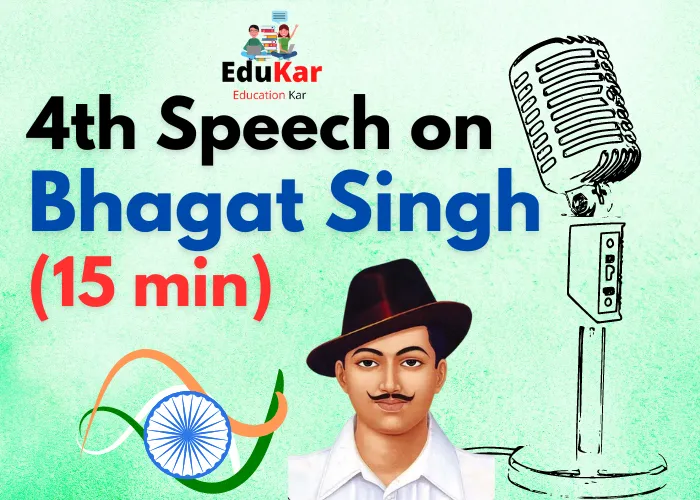
Honorable judges, esteemed guests, and my dear fellow citizens.
I stand here today to speak about one of the most iconic revolutionaries of Indian history – Bhagat Singh.
Bhagat Singh was a freedom fighter who dedicated his life to the cause of Indian independence. Born in September 1907 in a family of freedom fighters, he was inspired by the bravery and sacrifices made by his ancestors in the fight against British imperialism. He was a true patriot who believed that freedom was the birthright of every Indian and was willing to do everything in his power to achieve it.
Bhagat Singh was not just a revolutionary; he was also an intellectual who had a deep understanding of the political and social issues of his time. He was a voracious reader who devoured books on socialism, communism, and revolutionary movements. He was influenced by the ideas of Karl Marx and Vladimir Lenin and believed that socialism was the only way to achieve true freedom and equality for the Indian masses.
Bhagat Singh’s revolutionary activities began in his teenage years when he formed the Naujawan Bharat Sabha, a revolutionary organization that aimed to mobilize young people to fight against British imperialism. He also joined the Hindustan Socialist Republican Association (HSRA), a revolutionary organization that believed in armed struggle against the British.
Bhagat Singh’s most famous act of resistance was the bombing of the Central Legislative Assembly in Delhi in 1929. The bombing was a symbolic act of defiance against the British government and was meant to protest against the repressive measures being taken by the colonial authorities against freedom fighters. Bhagat Singh and his comrades courted arrest after the bombing and were eventually hanged by the British in 1931.
Bhagat Singh’s sacrifice for the cause of Indian independence continues to inspire generations of Indians to this day. His bravery, his intellect, and his unwavering commitment to the cause of freedom are qualities that every Indian should strive to emulate. Bhagat Singh was not just a freedom fighter; he was a symbol of hope and inspiration for millions of Indians who were struggling for their rights and dignity.
In conclusion, Bhagat Singh was a true patriot and a revolutionary who dedicated his life to the cause of Indian independence. He was a man of great intellect and courage who believed in the power of the people to bring about change. His legacy continues to inspire millions of Indians to fight for their rights and dignity, and his sacrifice will always be remembered as a shining example of the spirit of India’s freedom struggle. Thank you.
5th Bhagat Singh Speech (5 min)
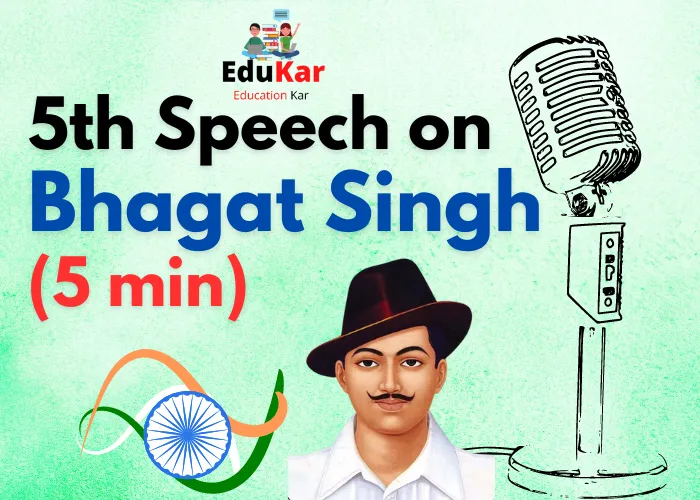
Ladies and gentlemen,
Today, I would like to talk about one of the most inspiring and influential revolutionaries of India, Bhagat Singh.
Bhagat Singh was born in 1907 in the village of Banga, Punjab. From a young age, he was deeply influenced by the struggle for independence and the ideas of socialism. He was an exceptional student, and his father hoped he would become a lawyer. However, Bhagat Singh was more interested in political activism and social justice.
In 1928, Bhagat Singh and his comrades were involved in the assassination of British police officer, John Saunders. This was a direct response to the brutal and oppressive policies of the British colonial government in India. The group, which came to be known as the Hindustan Socialist Republican Association (HSRA), believed in using violence to overthrow the British rule and create a socialist state in India.
Bhagat Singh was not just a revolutionary; he was also a thinker and writer. He was a prolific writer, who penned down his thoughts on various social and political issues of his time. His writings were focused on the need for a socialist revolution and the importance of unity among the oppressed people.
Bhagat Singh was not just fighting for India’s freedom from British rule, but also for the rights of workers and peasants. He was a firm believer in the idea that political freedom alone is not enough; economic freedom and social justice are also essential for true liberation.
Bhagat Singh’s contribution to the Indian independence struggle is immeasurable. His daring acts of defiance against the British Empire inspired a generation of freedom fighters. He became a symbol of resistance against colonialism, and his name became synonymous with bravery and sacrifice.
Despite being sentenced to death by the British, Bhagat Singh remained resolute in his beliefs until his last breath. He chose to embrace death rather than compromise on his principles.
Today, Bhagat Singh’s legacy lives on, inspiring generations of Indians to stand up for their rights and fight for a just society. His ideas and thoughts continue to shape the discourse on politics and social justice in India.
In the end, Bhagat Singh sacrificed his life for the cause he believed in. As we celebrate his life and legacy, let us remember his message of unity, equality, and justice. Let us strive to build a society that embodies these values, just as Bhagat Singh did. Thank you.
FAQs
Who was Bhagat Singh?
Bhagat Singh was an Indian revolutionary socialist who played a significant role in India’s struggle for independence from British rule.
What was the contribution of Bhagat Singh in India’s freedom struggle?
Bhagat Singh was a key member of the Indian nationalist movement and played a significant role in the fight against British colonial rule. He participated in several revolutionary activities, including the Lahore Conspiracy Case and the bombing of the Central Legislative Assembly. He also wrote extensively on issues related to socialism and revolution.
What is the significance of Bhagat Singh in Indian history?
Bhagat Singh is considered one of the most influential revolutionaries in Indian history. He inspired a generation of young Indians to join the fight for independence and his ideas on socialism and revolution continue to be relevant even today.
What are some important events in Bhagat Singh’s life?
Some important events in Bhagat Singh’s life include his participation in the Non-Cooperation Movement, the formation of the Hindustan Socialist Republican Association, the Lahore Conspiracy Case, and the bombing of the Central Legislative Assembly.
What was Bhagat Singh’s ideology?
Bhagat Singh was a socialist and believed that the only way to achieve true freedom for India was through a socialist revolution. He was influenced by the ideas of Karl Marx and Vladimir Lenin and believed in the power of the working class to bring about social change.
What was Bhagat Singh’s legacy?
Bhagat Singh’s legacy includes inspiring a generation of young Indians to fight for independence and his ideas on socialism and revolution continue to be relevant even today. He is also remembered as a martyr for the cause of Indian independence.
What can we learn from Bhagat Singh’s life?
Bhagat Singh’s life teaches us the importance of standing up for what we believe in and fighting for justice and freedom. His ideas on socialism and revolution also remind us of the need for social and economic equality in our society.

![5 Best Speech on Jawaharlal Nehru[Short & Long] Jawaharlal Nehru Speech](https://edukar.in/wp-content/uploads/2023/03/Jawaharlal-Nehru-Speech.webp)
![5 Best Speech on Shivaji Maharaj [Short & Long] Speech on Shivaji Maharaj](https://edukar.in/wp-content/uploads/2023/03/Speech-on-Shivaji-Maharaj.webp)
![5 Best Speech on APJ Abdul Kalam [Short & Long] APJ Abdul Kalam Speech](https://edukar.in/wp-content/uploads/2023/03/APJ-Abdul-Kalam-Speech.webp)
![Speech on Lal Bahadur Shastri [Short & Long] Speech-on-Lal-Bahadur-Shastri-](https://edukar.in/wp-content/uploads/2023/03/Speech-on-Lal-Bahadur-Shastri-.webp)
![Speech on Mahatma Gandhi [Short & Long] Speech on Mahatma Gandhi](https://edukar.in/wp-content/uploads/2023/03/Speech-on-Mahatma-Gandhi.webp)
![Speech On Swami Vivekananda [Short & Long] Speech On Swami Vivekananda](https://edukar.in/wp-content/uploads/2023/03/Speech-On-Swami-Vivekananda.webp)

![5 Best Global Warming Speech [Short & Long] Global Warming Speech](https://edukar.in/wp-content/uploads/2023/03/Global-Warming-Speech.webp)
![Speech about Nature [Short & Long] Speech about Nature](https://edukar.in/wp-content/uploads/2023/03/Speech-about-Nature.webp)
![Speech on Success [Short & Long] Speech on Success](https://edukar.in/wp-content/uploads/2023/03/Speech-on-Success.webp)

![5 Best Speech on Clean India [Short & Long] Speech on Clean India](https://edukar.in/wp-content/uploads/2023/03/Speech-on-Clean-India.webp)

![5 Best Speech on Air Pollution [Short & Long] Speech on Air Pollution](https://edukar.in/wp-content/uploads/2023/03/Speech-on-Air-Pollution.webp)
![Speech on Cleanliness [Short & Long] Speech on Cleanliness](https://edukar.in/wp-content/uploads/2023/03/Speech-on-Cleanliness.webp)
